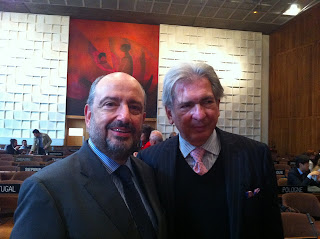Wednesday, March 16, 2011 -  1970 Convention,Canada,UNESCO
1970 Convention,Canada,UNESCO
 No comments
No comments
 1970 Convention,Canada,UNESCO
1970 Convention,Canada,UNESCO
 No comments
No comments
Mexico and Canada at UNESCO's meeting on the 40th anniversary of the 1970 Convention
 |
| Ambassador Carlos de Icaza and Jorge Sánchez-Cordero |
PARIS - I have two-days of notes on the more than 11 hours of panels and discussions that occurred over the past two days at UNESCO as attendees and experts discussed the 1970 Convention, the first international agreement that recognized that the smuggling and trade of art, antiquity objects, and the illegal excavations of archaeological sites was a global problem best attacked with international cooperation. But it is a beautiful spring evening in Paris and the Louvre is open tonight so this post features the delegates from Mexico and the anecdote of how I purchased a great cup of decaffeinated coffee as I walked away from the conference.
Carlos de Icaza, Ambassador of Mexico in France (and former Ambassador to the United States, spoke at the public debate today, moderated by the distinguished Dr. Davidson L. Hepburn, Chairman of the Antiquities, Monuments and Museums Corporation of The Bahamas. Ambassador de Icaza spoke about Mexico's history with the 1970 convention -- it was actively involved in the formulation and the eight country to ratify it. A national inventory identifies archaeological artifacts in public and private collections in Mexico. However, he said, "We are in a situation that we cannot tolerate. Many countries are being plundered through clandestine excavations. Despite all our efforts, criminals operate on sites and in the trafficking of cultural and archeological objects."
He went on to ask that UNESCO consider finding solutions to the gaps in the 1970 convention. "It is practically impossible to prove ownership from illicit excavations or from underwater sites. There is a huge illicit market today."
The Canadian delegate, Kathryn Zedde, Senior Policy Analyst for Canadian Heritage, later responded that "gaps" are in the interpreting and implementing the 1970 convention. "Canada has returned objects to ten other states including multiple groups of objects and none have been on any inventory list and almost all of them have been archaeological artifacts. Canada's legislation has prohibited the importing of any cultural property from other countries. We don't require objects to be listed as stolen from any museum."
Hours of discussion followed this subject so I'll write more about it later.
 |
| Antoine Netien and Tom Clark at Coutume |


0 comments:
Post a Comment